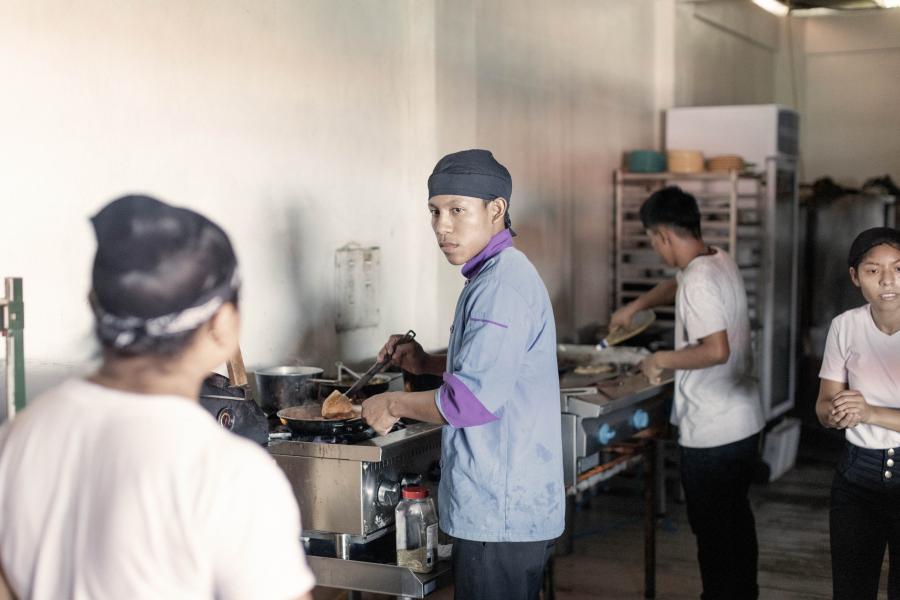2022 Year-end population figures
- Refugees: 145,800
-
Asylum-seekers: 503,900
-
IDPs: 318,600
-
Other populations of concern*: 241,900
*Population figures for forcibly displaced people from El Salvador, Honduras, and Guatemala in Belize, Canada, Costa Rica, El Salvador, Guatemala, Honduras, Mexico, Panama, Spain and the United States of America.
2022 situation overview
More than 1 million people had been uprooted from their homes in Central America by the end of 2022 due to violence, insecurity and persecution, mainly by criminal organizations. The number of asylum-seekers and refugees from El Salvador, Guatemala and Honduras worldwide reached 665,200, while internal displacement continued to affect all countries in the sub-region. Asylum systems in Central America and Mexico continued to deal with an increasing number of asylum claims. Mexico again ranked among the top receiving countries of asylum applications in the world, with 118,800 new asylum claims.
El Salvador's Congress extended the state of emergency that began in March 2022 in an effort to end gang violence. By the end of the year, more than 60,000 people had been arrested and territorial control by gangs showed signs of wearing away, while access to communities historically controlled by gangs improved. In addition, the Government declared a red alert across the country and a 15-day state of national emergency due to Tropical Storm Julia. Authorities coordinated the evacuation to shelters of 5,170 people living in zones at risk. Across the country, there were reports of damaged homes, overflowing rivers, collapsed bridges, landslides and blocked roads.
Guatemala continued receiving asylum claims at a similar level to 2021, making it a host country as well as a source of refugees. The Government received almost 1,000 asylum applications and recognized 254 people as refugees in 2022. Hondurans, Salvadorians and Nicaraguans constitute Guatemala's main nationalities seeking international protection. However, 2022 saw a 100% increase in claims presented by Venezuelans. UNHCR inaugurated a new field unit in Huehuetenango, increasing its field presence and supporting local governments and civil society organizations in creating protection mechanisms for refugees and Guatemalans at risk. Along with UNICEF, IOM and the Guatemalan Migration Institute, UNHCR inaugurated a new Attention Centre for Migrants and Refugees in Agua Caliente, Esquipulas; and one in El Cinchado, Izabal, near the border with Honduras.
In 2022, Honduras saw an increase in criminal activity and displacement. In addition, landslides, floods, and road collapses affected more than 80,000 people and caused more than 20 deaths. 2022 saw the second-highest number of deportations to Honduras in eight years. After January 2022, returns to Honduras were coordinated and ordered, passing through the three Centres for Attention to Returned Migrants. In addition to increasing efficiency in the return process, the coordination through these centres aimed to protect returnees and improve reception conditions after a hard journey outside of the country. Within the framework of the "Law for the Protection of Honduran migrants and members of their families" (2013), as well as the Comprehensive Regional Protection and Solutions Framework (MIRPS), the State of Honduras developed protocols for the identification of cases of people with protection needs. In addition, the approval of the “Law for the Prevention, care, and protection of internally displaced people” in December 2022 brought about new opportunities for consolidating the institutional response to internal displacement in Honduras. UNHCR played a key role in advising Congress and providing technical support to the authorities in the framework of the approval process of the law.
To enhance prevention and collaborative responses to internal displacement in the three countries, UNHCR expanded its field presence and direct service delivery, further strengthened its advocacy and leading role in the Protection clusters/sectors, coordinating with relevant stakeholders, including national and local governments, international organizations, civil society, grass-roots and community organizations and displaced populations. UNHCR also strengthened its protection-oriented interventions in key communities to prevent displacement and strengthen protection alternatives for people at risk, focusing on adolescents and women at risk. UNHCR also actively engaged with Resident Coordinators and UN country teams in promoting the implementation of the Secretary-General's Action Agenda on Internal Displacement, launched in June 2022.
In Mexico, UNHCR played a key role in providing the tools required for thousands of refugees to integrate within their host communities with the Relocation, Job Placement and Local Integration Program (PIL). Over 12,800 recognized refugees and people with complementary protection took part in the PIL, reaching a total of 28,700 participants since the beginning of the programme in 2016.
MIRPS, a regional forum to address the challenges posed by displacement which collaborates on data collection and analysis, early warning systems, protection, and local integration, held its fifth annual meeting in Tegucigalpa in December 2022. In 2022, it was strengthened with the participation of the Central American Bank for Economic Integration and the World Bank, and the United States of America took on the role of chair of the MIRPS Support Platform.
UNHCR maintained its catalytic role in other complementary regional processes, ensuring that forced displacement remains high on the agenda of the Central American Integration System, the Regional Conference on Migration and the discussion on the implementation of the Comprehensive Development Plan led by the Economic Commission for Latin America and the Caribbean.
